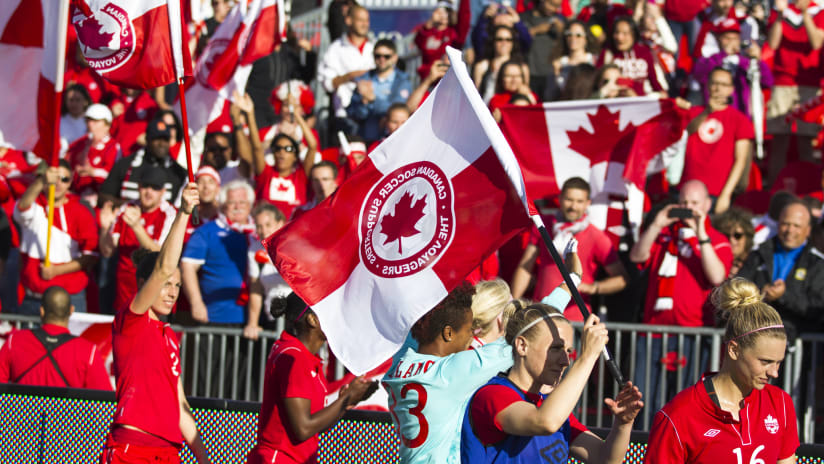So, which Canadian city deserves to host that crucial World Cup qualifier against El Salvador on Sept. 6?
Is it Vancouver, which has drawn big crowds for the Canadian national team’s last two qualifiers? Toronto, the team’s erstwhile home base? Montreal or Edmonton, who haven’t hosted since the 2010 World Cup cycle? Winnipeg or Ottawa, with their shiny new stadiums? St. John’s, for the historical and emotional connection?
Well, here’s the thing. None of those cities “deserves” it. No city does. When it comes to World Cup qualifying, only one thing matters – getting an on-field result. The selection of venue should reflect that.
Canadian Soccer Association president Victor Montagliani suggested as much during a Thursday press conference in Vancouver, in which he announced that BC Place will host that fate-deciding showdown in September. Based on the team’s recent history, it was the correct decision.
Let’s recall that ahead of the 2014 World Cup qualification cycle, the CSA decided to put all of Canada’s home games at Toronto’s BMO Field. The thinking was that playing repeatedly in the same venue would increase familiarity and comfort for the players, while also strengthening the fanbase as the campaign went on.
Both of those objectives came to fruition. Canada were undefeated in their six home qualifiers in that cycle, and the pro-Canada support – led by the Voyageurs – grew with each game. This, in and of itself, was something new. Traditionally, Canada had been out-sung and out-cheered in their own home stadiums; this campaign was a turning point.
With BMO Field unavailable for the start of this qualifying round, the team headed to Vancouver (for the first time in a decade) and posted a 1-0 win over Honduras in November, in front of a raucous crowd of over 20,000, once again led by the Voyageurs.
When the question arose of where to play against Mexico in March, some yearned for a chilly outdoor venue to “freeze out” the visitors – Edmonton, Winnipeg, Ottawa or even the oilsands outpost of Fort McMurray.
While revisionist historians will forever wonder whether an Albertan snow squall could have slowed down Chicharito and company on the day, it seems unlikely Canada could have posted a victory against that Mexican squad. It’s also unlikely they would have produced the record crowd that they did – 54,798 fans, the highest ever attendance for a national team game in this country.
That turnout seemed to make the announcement of Vancouver’s hosting duties in September a mere formality. Though no one is anticipating anything near another full-stadium sellout, the buzz generated in Vancouver should ensure another sizable crowd. The team itself raved about the atmosphere inside BC Place following that win over Honduras in November.
But where does that leave the rest of the country? Centralizing national team games in one place might make logistical sense for fans in many other countries. As for a place the size of Canada, well… not so much.
Sure, most fans can intellectually accept the reasoning behind putting the upcoming game in Vancouver, based on the established criteria for choosing these sorts of things (player comfort + fan turnout = win, hopefully).
But the whole debate speaks to a deeper issue, and it’s the reason why the selection of World Cup qualifying venues is so contentious in Canada – the team rarely ever plays home friendlies.
Since the beginning of 2006, Canada have played eight home friendlies, spread across just three cities (Toronto, Montreal and Edmonton). In that same decade-long span, Canada have played 11 friendlies in the United States, not to mention friendlies played in far-flung countries across the globe.
Heck, Canada’s one confirmed “A” friendly this summer, ahead of that big World Cup qualifier, is against Azerbaijan – and it’s being played in Austria.
Of course, much of that comes down to cash. Though the CSA keeps a tight lid on its annual budget breakdown, the conventional thinking is that the organization simply isn’t in a financial position to host numerous friendlies. This may be the case; and if so, playing friendlies in the US or Europe is better than playing no friendlies at all.
But the corollary impact is that Canadian fans have become accustomed to viewing World Cup qualifiers as the only opportunity they’ll have to see the team play on home turf. So when a string of consecutive qualifiers lands in the same city – be it Toronto or Vancouver – fans everywhere else begin wondering: “What are the chances of me getting to see the team play live anytime soon?”
Some fans take matters into their own hands; recent qualifiers in Toronto drew supporters from as far afield as Newfoundland and Saskatchewan, while the last two games in Vancouver drew fans from Manitoba and Canada’s northern territories. But such expansive travel simply isn’t a feasible option for many supporters.
Perhaps the team’s best chance at winning in World Cup qualifying is to centralize its home games in one place – and if so, that’s what the CSA should do. But it’s also incumbent upon the CSA to find a way to play more friendlies at home in the years to come, to build up the team’s presence and sense of connection across the land.
That way, when it comes time for a big World Cup qualifier, fans can focus less on regional bickering and more on what the team will be doing on the field.













